FORT PIERCE, Fla.—Lukas Hallman ponders a hypothesis he formed four years ago: “How can we sustainably improve nutrient management of citrus trees under citrus greening disease?”
Earned MSc and Ph.D. at UF/IFAS IRREC under the direction of Rossi
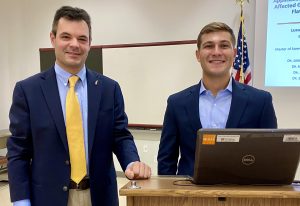
Hallman completed both a Master of Science and a Ph.D. in Horticultural Science in the last six years as a graduate research assistant in Dr. Lorenzo Rossi’s Plant Root Biology Laboratory at the University of Florida/IFAS Indian River Research and Education Center (IRREC) in Fort Pierce, Florida. The IRREC is at the center of the Indian River District, the world’s premier grapefruit production region.
At the center of Hallman’s graduate studies is an interest that developed while his family lived in Florida. He understood that the state’s citrus industry provided healthful fruit that brought worldwide consumer demand.
“I grew up partially in Florida, and as a youth, I realized how important a crop can be to a state’s economy and the people who grow the fruit,” said Hallman. “When I completed a bachelor’s degree in Plant Science at the University of Maryland, I knew I wanted to head to Florida because the state’s signature crop was under a major threat—it’s a topic I care about.”
Hallman’s academic achievements and contributions are distinguished for a graduate student and among his peers, Rossi said.
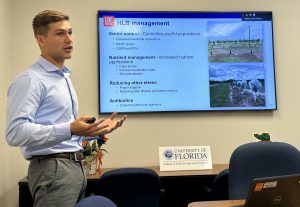
Graduate student achievements exceed expectations
“He published 10 peer-reviewed journal articles in some of the world’s most prestigious scientific publications, such as Scientia Horticulturae, an internationally weighted science journal, and in HortScience, the premier American journal, published by the American Society for Horticultural Science,” said Rossi.
Rossi said Hallman’s doctoral research involved cover crops for citrus crop production. Cover crops are grasses and legumes that hold high nutrients and grow in the ‘middles’ of citrus crop rows. The cover crops were terminated or plowed under during mid-summer so that their decomposition would enrich the same soil near the citrus trees. Hallman aims to help Florida’s citrus growers continue their work to produce the state’s signature crop.
Dissertation
Hallman’s dissertation, “Nutrient management strategies for citrus production in the age of citrus greening: evaluating the role of cover crops on soil fertility and tree growth in Southeast Florida,” examined the resurgence of cover crops to improve fertility of Florida’s sandy, low-nutrient soils. Part of the dissertation has been published in HortTechnology, “Use of Cover Crops in Florida’s Citrus Industry: History and Resurgence, Current Practices, Challenges, and Opportunities.” Rossi said the work is scholarly and points to further research needs. Although Hallman realized that more extended studies are necessary to form research data that growers may use in their operations, the work is high quality.
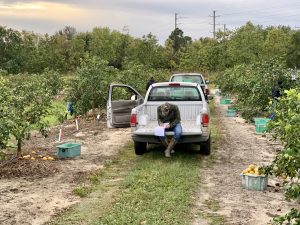
Visits to all of America’s citrus production regions
“In the past five years, Dr. Hallman was able to see all of America’s citrus production regions with our field trips,” said Rossi. “We started with Texas, Arizona, and then visited California’s industry this year,” Rossi said.

Internship in Switzerland
Hallman shipped excavated grapefruit trunks ahead of his visit to Zürich, Switzerland, where he studied under a world-renowned tree ring expert, Paolo Cherubini. During the 2-monthlong internship, Hallman examined the grapefruit wood samples to identify changes in the tree’s rings when the trees became infected with citrus greening, the world’s most serious citrus disease.
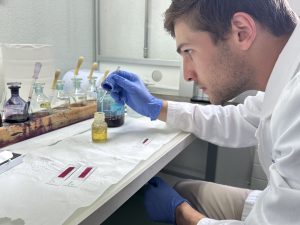
The cover crops investigations and the tree ring study are among the earliest studies that relate to the crops’ production in the throes of the worldwide crisis with citrus greening. Where Florida groves were once a part of the vast landscape, some exist on much smaller scales, but their maintenance comes at a higher cost. Diseases and the encroachment of development compete with production. As part of his doctorate work, Hallman discovered cover crops were used in the 19th Century and the first half of the 20th Century but then disappeared from research work in the 1960s, when synthetic agrochemicals became a standard in citrus production, said Hallman.
Prestigious awards
Hallman credits Rossi for the many awards and achievements garnered throughout the last six years as a graduate student. Rossi applied for and successfully received a UF/IFAS College of Agricultural and Life Sciences Dean’s Award that provided full funding for Hallman’s degrees. Rossi mentored Hallman for a successful U.S. Department of Agriculture Sustainable Agriculture Research and Education grant. Not many graduate students apply for or receive grants from prestigious institutions and federal agencies for their graduate work, Rossi said. And then came the coveted awards: the American Society for the Horticultural Science Outstanding Graduate Horticulture Student Award and membership in Sigma Xi, the most prestigious international society for scientists.
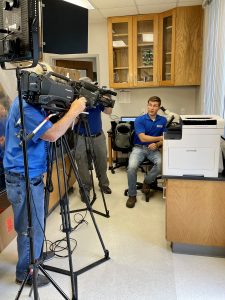
Hallman consistently projects a suave manner in appearance and demeanor, especially when challenges are present, note his advisors. For example, Hallman delivered his dissertation to his professors, family members, and peers despite the unavailability of internet service due to destruction left by an EF-3 tornado that caused significant electrical infrastructural outages and the instant demolition of a greenhouse in which Hallman’s doctoral work was completed.
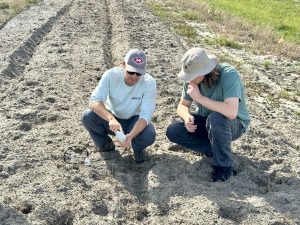
“Dr. Hallman carries himself and his work like a full-fledged colleague,” said Mark Ritenour, IRREC associate director and professor of horticulture. Ritenour served on Hallman’s Ph.D. committee, evaluated his work throughout the entire process, and recommended his elevation to a Doctor of Philosophy in Horticultural Science.
In addition to Hallman’s evaluators, those who worked alongside him in the laboratory concur with his evolving leadership capabilities.
“In the opportunities I have had to work with Lukas, he always maintains composure, and he figures out what the best solution is and proceeds in a logical manner,” said Joseph Paoli, who began work in the Rossi laboratory as an intern and now pursues a master’s degree. “Dr. Hallman always maintains a good atmosphere. He knows how to lead us out of a difficulty and overcome problems as a team.”
 4
4
